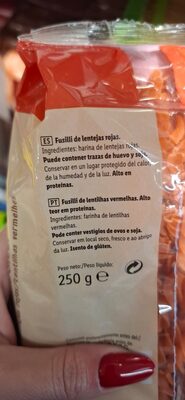
Barcode: 4056489206859
HALAL
📝 Reason: All ingredients are plant-based or trace amounts of egg and soy, which are not Haram. No alcohol, pork, or Haram E-codes are present. The product is considered Halal compliant based on the ingredients listed.
📄 Certificates: None
Ingredients:
Details
Understanding the Halal Status of Rode Linzenbloem
As consumers become more conscious of their dietary choices, understanding the Halal status of products becomes paramount. Rode Linzenbloem, a versatile ingredient derived from red lentils, is often used in various culinary applications. But is it Halal? Let’s dive deep into its ingredients and E-numbers to clarify.
What Makes Rode Linzenbloem Halal?
The primary ingredient in Rode Linzenbloem is simply red lentil flour. This ingredient is inherently plant-based, meaning it holds substantial potential for being classified as Halal. Furthermore, the product notes that it may contain traces of egg and soy. Although this might raise some eyebrows, it’s essential to understand that these trace components do not render the product Haram.
Ingredient Breakdown
- Rode Linzenbloem: This flour comes directly from red lentils. It is considered a Halal ingredient because it does not contain any Haram components or common allergens that would typically pose issues for Halal compliance.
- Kan sporen van ei en soja bevatten: This phrase indicates that the product may have traces of egg and soy. However, it’s critical to know that these trace elements do not translate to non-Halal status, especially since the primary ingredient remains plant-based.
Evaluating the E-numbers
When checking for Halal compliance, E-numbers can often cause confusion. However, in the case of Rode Linzenbloem, the ingredients listed do not include any E-numbers that are linked to prohibited (Haram) substances. Here’s a brief overview:
- E-Code: None. Since no E-numbers are present, there are no concerns regarding additives that could breach Halal guidelines.
- Red Lentil Flour: As mentioned, this ingredient is free of any Haram or questionable elements.
- Traces of Egg and Soy: While these may not be ideal for vegans, they do not make the product non-Halal.
The Certification Context
Unlike many products on the market that boast Halal certifications, it is worth noting that Rode Linzenbloem does not have any specific Halal certifications. Nevertheless, based on our analysis of the ingredients and their sources, we conclude that Rode Linzenbloem is likely Halal compliant. This positions it as an excellent option for consumers seeking a healthy, plant-based ingredient without the concerns of non-Halal additives.
Why Choose Halal
Opting for Halal products like Rode Linzenbloem isn’t just about adherence to dietary laws; it often aligns with health-conscious choices. Such products are generally free from harmful additives and made with quality ingredients. As more consumers shift towards cleaner labels, the demand for Halal products continues to rise, supporting ethical practices in our food systems.
Final Thoughts
In summary, Rode Linzenbloem stands out as a Halal option for those interested in maintaining a Halal diet. Its primary ingredient being red lentil flour, with trace amounts of egg and soy, does not compromise its Halal status. For anyone searching for a natural, plant-based flour, Rode Linzenbloem is a safe and healthy choice. Always remember to check ingredient labels and stay informed on the latest regulations in the Halal community.

